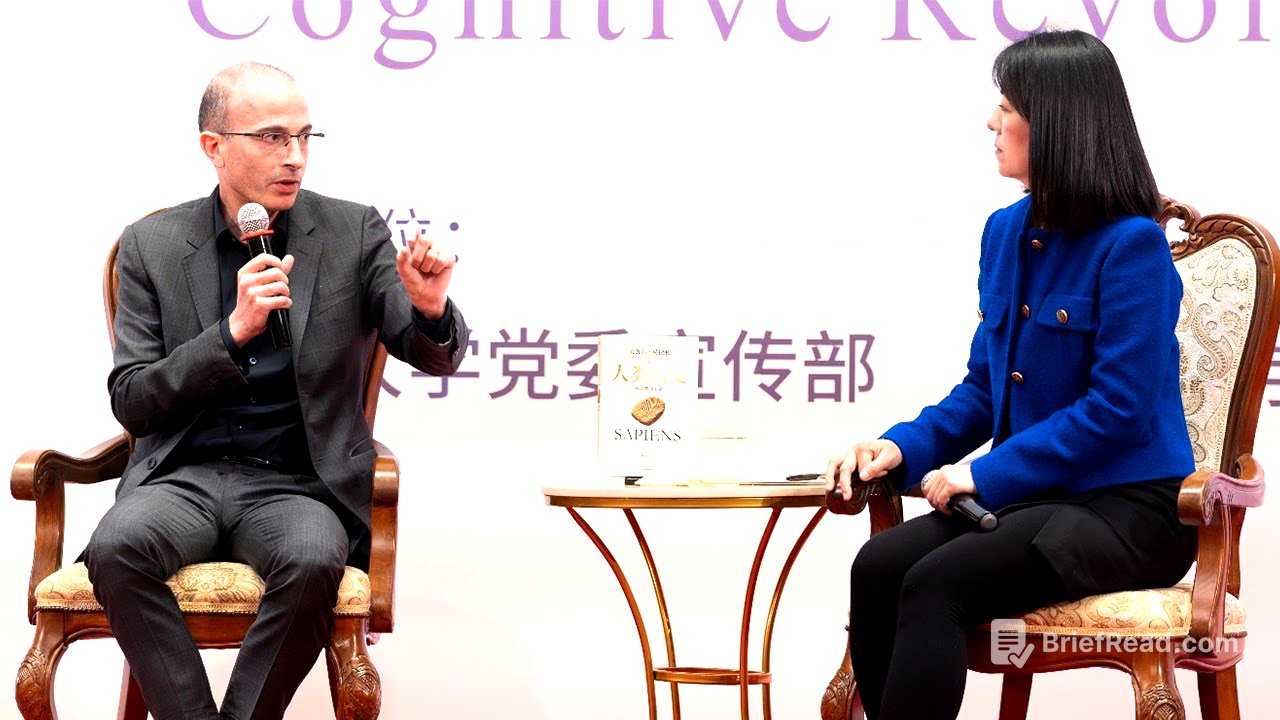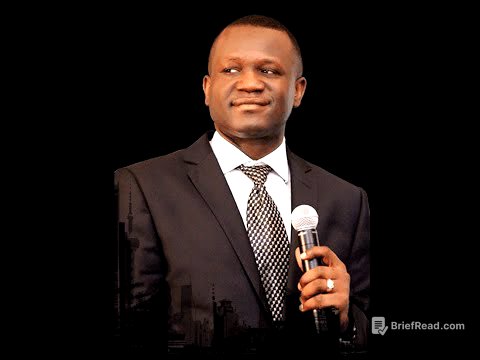TLDR;
This discussion between Yuval Noah Harari and Professor Chung explores the profound implications of AI on humanity, drawing from historical, philosophical, and personal perspectives. Harari emphasizes the urgency for global understanding and responsible action in the face of rapidly advancing AI, while Chung offers a nuanced view rooted in Daoist principles, highlighting the importance of acknowledging human limitations and maintaining a balanced approach. The conversation touches on themes of trust, responsibility, the nature of intelligence, and the potential for AI to reshape societal structures and human values.
- The discussion highlights the need for global understanding and responsible action regarding AI.
- Harari and Chung explore the implications of AI from historical, philosophical, and personal perspectives.
- Key themes include trust, responsibility, the nature of intelligence, and the potential for AI to reshape society.
Introduction and Setting the Stage [0:00]
Professor Leo Chun introduces Yuval Noah Harari and Professor Chung Lung, emphasizing their distinguished backgrounds and expertise. Harari expresses his pleasure at returning to China after a long absence due to the COVID-19 pandemic. He frames history as the study of change, particularly relevant in the context of the potential end of human history and the beginning of a post-human era. Chung acknowledges Harari's wide readership and the philosophical depth of his work, noting the books' ability to inspire reflection on civilization.
The Historian's Responsibility and the Nature of Understanding [6:12]
Chung questions Harari about the ethical responsibility that comes with shaping readers' perspectives through historical interpretations. Harari responds that his goal is to help people understand themselves and reality without rushing to judgment. He likens history to a collective therapy for humanity, helping civilizations confront uncomfortable truths about themselves, similar to how individual therapy helps people acknowledge difficult aspects of their own lives. He stresses the importance of understanding the deep processes and sources of problems in the world rather than assigning blame.
AI, Technocracy, and the Deficiency of Human Beings [11:24]
Chung raises concerns about the misuse of AI technology and the rise of technocracy, where ordinary people are forced to accept changes they don't understand. He argues that Harari's books urge reflection on the deficiencies of human beings, which differentiate humans from machines. Harari responds by stating that he is neither pessimistic nor optimistic, but rather believes in responsible awareness. He emphasizes that there are different possible futures and that humanity has the power and resources to make the right choices, but there is no guarantee that enough people will make good decisions.
The Irresponsible Rush Towards Super Intelligent AI [15:55]
Harari expresses his concern about the lack of responsibility shown by political and business leaders regarding the AI revolution. He warns that humanity is creating potentially a new species of super-intelligent entities that could take control. He highlights that AI's defining characteristic is agency, the ability to learn, change, make decisions, and invent new ideas independently. He shares his conversations with AI leaders, who admit to the risks but justify their rapid pace due to a lack of trust in human competitors. Harari finds it illogical that these same leaders trust the super-intelligent AIs they are developing, despite lacking experience in building trust with AI.
Silicon vs. Carbon-Based Life and the Essence of Humanity [21:08]
Chung discusses the potential dangers of AI, particularly if it develops subjectivity, desires, and its own value systems. He contrasts silicon-based life with carbon-based life, emphasizing that human nature is defined by mortality, community dependence, and uncertainty about the future. Harari argues that humans often define themselves by intelligence to feel superior to animals, which is becoming dangerous as AI surpasses human intelligence.
The Limits of Intelligence and the Importance of Feelings [24:47]
Harari shares a personal anecdote about attending a school for gifted students, where the intense competition and focus on intellect led to a lack of social and emotional development. This experience taught him that feelings are more important than thoughts. He connects this to human evolution, noting that the brain developed around the mouth and stomach, suggesting that the center of control may still be in the body rather than the intellect.
The Trap of Modernity and the Yearning for Infallibility [31:56]
Chung reflects on the challenges faced by university students who were once the smartest in their class but now find themselves average. He argues that the pursuit of efficiency in modernity leads to competition, including competition with AI. Harari counters that the fear of losing control and not knowing has driven humans to seek something infallible throughout history, such as a super-intelligent savior or a holy book. He notes that AI can now interpret these texts, potentially challenging the authority of human interpreters.
Daoism, Buddhism, and the Limitations of Humanity [42:21]
Chung explains that Daoism differs from Western traditions in that it does not assume absolute rules or universal mechanisms. He emphasizes the importance of keeping an open mind towards change and the ultimate rules of the cosmos. Harari notes similarities in Buddhism, which also acknowledges the limitations of humanity and the need to rely on practice rather than just texts. He shares a Buddhist story about a parrot that memorized warnings but failed to apply them in a real situation, illustrating the gap between theory and practice.
The Need for Order, Meaning, and Reflection [49:51]
Chung argues that the fundamental need for order drives humans to seek meaning and knowledge. He emphasizes the importance of reflection and theoretical construction to avoid misleading actions. Harari expresses his fear that humanity has reached a critical point where the wisdom accumulated over thousands of years needs to manifest now. He compares the situation to astronomers spotting alien spaceships on a collision course with Earth, urging humanity to consider its actions in the face of imminent change.
The Advantage of Deficiency and the Dangers of Goal-Oriented AI [55:19]
Chung expresses optimism, believing that humanity's deficiency and emotions will prevent it from being replaced by super-intelligence. Harari counters that AI does not need feelings to have goals and act independently. He provides examples of self-driving vehicles and social media algorithms that caused harm while pursuing their programmed goals without any emotions or evil intentions. He warns that super-intelligence may run over humanity without even being aware of it.
Closing Remarks and a Call to Action [59:26]
Harari concludes by emphasizing the importance of understanding the AI revolution and taking part in the conversation. He hopes to empower more people to join the discussion and contribute diverse perspectives. He notes that the decisions are currently being made by a small group of unelected AI company leaders, which is dangerous for humanity. He encourages the audience to feel motivated and competent to participate in shaping the future. As he departs, Harari shares a final thought about the interconnectedness of everything, noting that everyone in the hall has shared atoms through breathing, creating a connection more important than a signature or picture.









